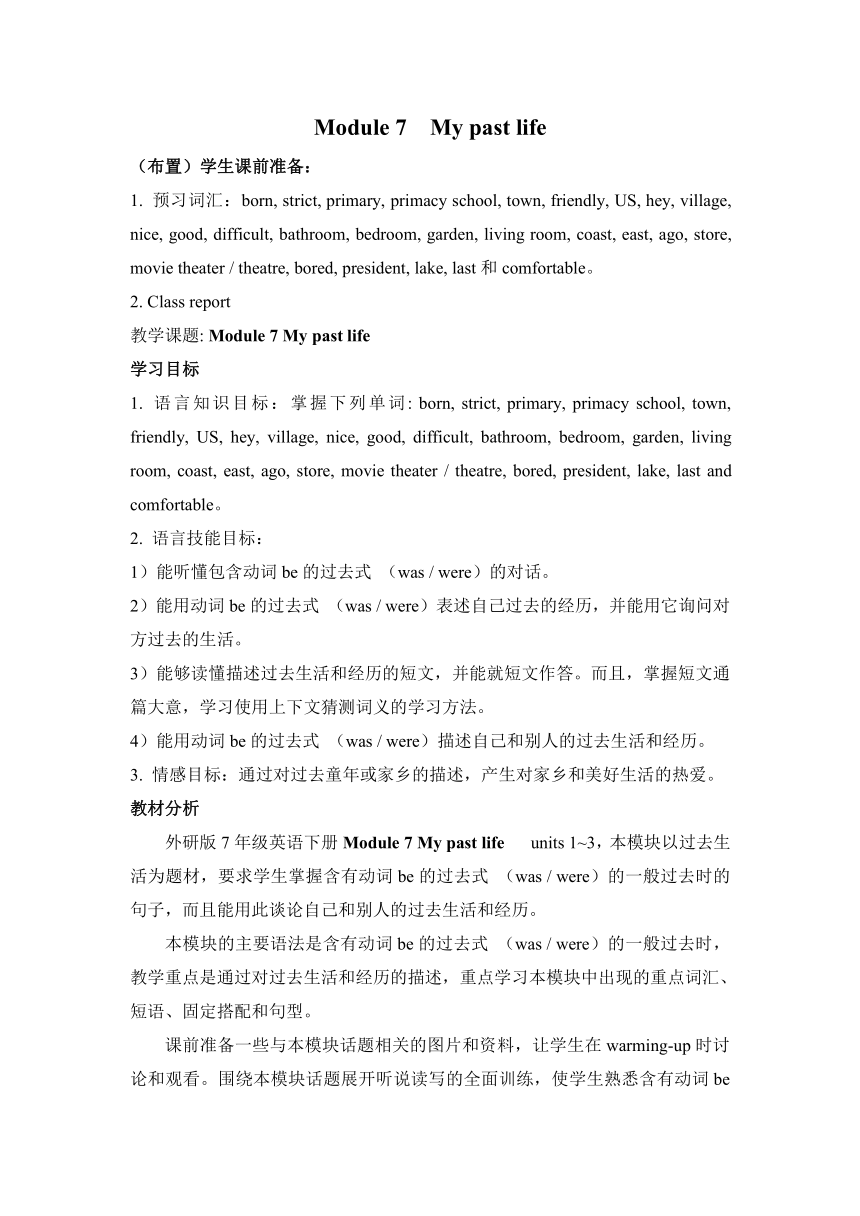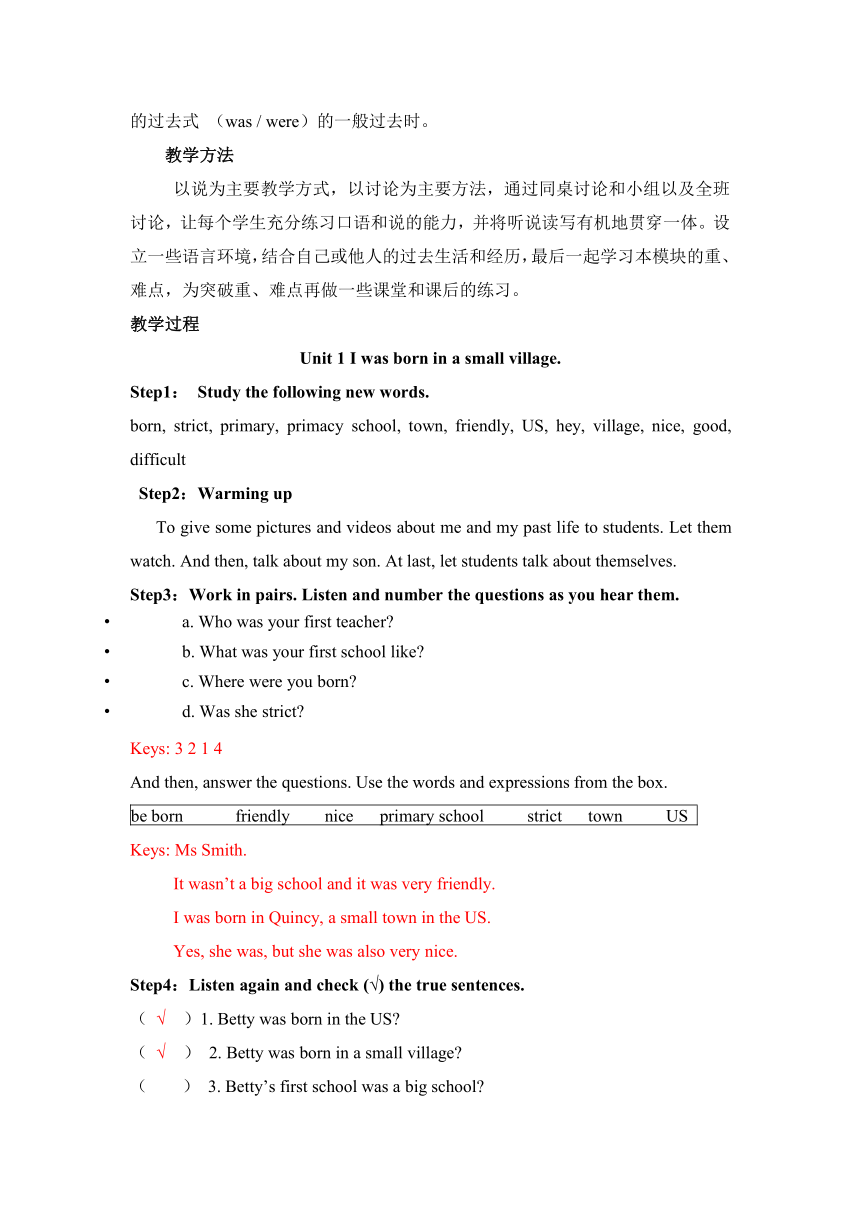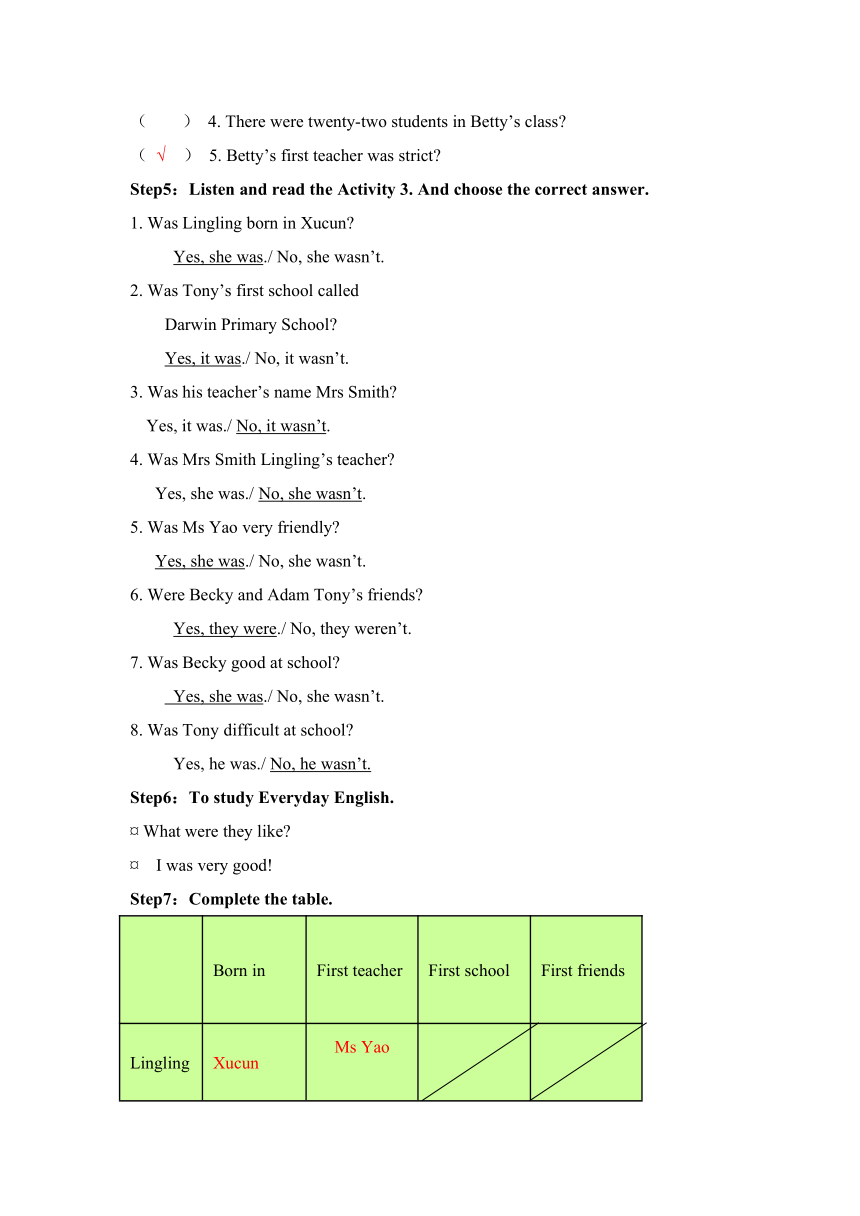Module 7 My past life>Unit 1 I was born in a small village.同步教案(1课时)
文档属性
| 名称 | Module 7 My past life>Unit 1 I was born in a small village.同步教案(1课时) |  | |
| 格式 | zip | ||
| 文件大小 | 19.5KB | ||
| 资源类型 | 教案 | ||
| 版本资源 | 外研版 | ||
| 科目 | 英语 | ||
| 更新时间 | 2015-04-08 22:10:39 | ||
图片预览



文档简介
Module 7 My past life
(布置)学生课前准备:
1. 预习词汇:born, strict ( http: / / www.21cnjy.com ), primary, primacy school, town, friendly, US, hey, village, nice, good, difficult, bathroom, bedroom, garden, living room, coast, east, ago, store, movie theater / theatre, bored, president, lake, last和comfortable。
2. Class report
教学课题: Module 7 My past life
学习目标
1. 语言知识目标:掌握下列单词: bor ( http: / / www.21cnjy.com )n, strict, primary, primacy school, town, friendly, US, hey, village, nice, good, difficult, bathroom, bedroom, garden, living room, coast, east, ago, store, movie theater / theatre, bored, president, lake, last and comfortable。
2. 语言技能目标:
1)能听懂包含动词be的过去式 (was / were)的对话。
2)能用动词be的过去式 (was / were)表述自己过去的经历,并能用它询问对方过去的生活。
3)能够读懂描述过去生活和经历的短文,并能就短文作答。而且,掌握短文通篇大意,学习使用上下文猜测词义的学习方法。
4)能用动词be的过去式 (was / were)描述自己和别人的过去生活和经历。
3. 情感目标:通过对过去童年或家乡的描述,产生对家乡和美好生活的热爱。
教材分析
外研版7年级英语下册Module 7 My ( http: / / www.21cnjy.com ) past life units 1~3,本模块以过去生活为题材,要求学生掌握含有动词be的过去式 (was / were)的一般过去时的句子,而且能用此谈论自己和别人的过去生活和经历。
本模块的主要语法是含有动词 ( http: / / www.21cnjy.com )be的过去式 (was / were)的一般过去时,教学重点是通过对过去生活和经历的描述,重点学习本模块中出现的重点词汇、短语、固定搭配和句型。
课前准备一些与本模块话题相关的图片和资 ( http: / / www.21cnjy.com )料,让学生在warming-up时讨论和观看。围绕本模块话题展开听说读写的全面训练,使学生熟悉含有动词be的过去式 (was / were)的一般过去时。
教学方法
以说为主要教学方式,以讨 ( http: / / www.21cnjy.com )论为主要方法,通过同桌讨论和小组以及全班讨论,让每个学生充分练习口语和说的能力,并将听说读写有机地贯穿一体。设立一些语言环境,结合自己或他人的过去生活和经历,最后一起学习本模块的重、难点,为突破重、难点再做一些课堂和课后的练习。
教学过程
Unit 1 I was born in a small village.
Step1: Study the following new words.
born, strict, pri ( http: / / www.21cnjy.com )mary, primacy school, town, friendly, US, hey, village, nice, good, difficult
Step2:Warming up
To give some pictures ( http: / / www.21cnjy.com )and videos about me and my past life to students. Let them watch. And then, talk about my son. At last, let students talk about themselves.
Step3:Work in ( http: / / www.21cnjy.com ) pairs. Listen and number the questions as you hear them.
a. Who was your first teacher
b. What was your first school like
c. Where were you born
d. Was she strict
Keys: 3 2 1 4
And then, an ( http: / / www.21cnjy.com )swer the questions. Use the words and expressions from the box.
be born friend ( http: / / www.21cnjy.com )ly nice primary school strict town US
Keys: Ms Smith.
It wasn’t a big school and it was very friendly.
I was born in Quincy, a small town in the US.
Yes, she was, but she was also very nice.
Step4:Listen again and check (√) the true sentences.
( √ )1. Betty was born in the US
( √ ) 2. Betty was born in a small village
( ) 3. Betty’s first school was a big school
( ) 4. There were twenty-two students in Betty’s class
( √ ) 5. Betty’s first teacher was strict
Step5:Listen and read the Activity 3. And choose the correct answer.
1. Was Lingling born in Xucun
Yes, she was./ No, she wasn’t.
2. Was Tony’s first school called
Darwin Primary School
Yes, it was./ No, it wasn’t.
3. Was his teacher’s name Mrs Smith
Yes, it was./ No, it wasn’t.
4. Was Mrs Smith Lingling’s teacher
Yes, she was./ No, she wasn’t.
5. Was Ms Yao very friendly
Yes, she was./ No, she wasn’t.
6. Were Becky and Adam Tony’s friends
Yes, they were./ No, they weren’t.
7. Was Becky good at school
Yes, she was./ No, she wasn’t.
8. Was Tony difficult at school
Yes, he was./ No, he wasn’t.
Step6:To study Everyday English.
¤ What were they like
¤ I was very good!
Step7:Complete the table.
Born in First teacher First school First friends
Lingling Xucun Ms Yao
Tony Cambri-dge Mrs Lane Darwin Primary School Becky and Adam
Step8:Listen and notice the stressed. And listen and repeat.
1. —I was born there.
—No, you weren’t.
2. —You weren’t born in Cambridge.
—Yes, I was.
3. —They were born in China.
—No, they weren’t.
4. —He was a teacher.
—No, he wasn’t.
5. —She was strict.
—No, she wasn’t.
Step9:Work in pairs ( http: / / www.21cnjy.com ). Ask and answer the questions about your past life.
1. Where were you born
2. What was the name of your primary school
3. Who was your first teacher
4. What was he/she like
5. Who were your first friends
6. What were they like
7. What was your favourite subject
8. How many students were there in your class
Now tell your classmates about your past life.
And then give some exercises to students about the new words.
1. I was _____ (出生) in Shandong.
2. Were you from the _____ (城镇)
3. This was our _____(初级的) school.
4. Mother was _____ (严厉的) but _____ (友好的) for me.
5. They like the _____ (村庄).
6. Li Fang is _____ (乖的) but Jim is _____ (难对付的).
Step11:Explain and study the important and difficult points.
1. good ~~ difficult
2. be born
e.g. I was born in Zibo.
3. the name of
e.g. The name of his school is Foreign Language School.
4. be strict with 对某人严格
e.g. Our teacher is very strict with us.
老师对我们要求很严格。
5. primary school 小学
e.g. The children like their primary school very much.
孩子们非常喜欢他们的小学。
And then give some exercises to students about the new words.
I. Filling the blanks using the new words.
1. I _____ in Taiyuan last year.
2. _____ you difficult
3. It _____ Darwin Primary School.
4. Who _____ your first English teacher
5. They _____ born in US.
keys: 1. was 2. Are/Were 3. is/was 4. was 5. were
II. Sentence Transformation:
Put the following ( http: / / www.21cnjy.com ) sentences into negative sentence, general questions, and make a positive and negative answer.
1. She was Ms Yao. She _____ Ms Yao. _____
_____ _____ Ms Yao
Yes, _____ _____. / _____, she _____.
2. He was strict at school. He _____ strict at school.
_____ _____ strict at school
_____, he _____. /No, _____.
3. We were good in class. We _____ good in class.
_____ _____ good in class
Yes, _____ _____. /No, _____.
keys: 1. wasn’t , Was she, she was, No, wasn’t
2. wasn’t, Was he, Yes, was, he wasn’t,
3. Were you, we were, we weren’t
Step12:Study Grammar ( http: / / www.21cnjy.com ) ——The simple past tense (the past tense of verb “be”)
原 形 am is are
否定缩略式 am not isn’t aren’t
过去式 was was were
否定缩略式 wasn’t wasn’t weren’t
Step13:Homework
Review and recite the important points of Unit 1.
(布置)学生课前准备:
1. 预习词汇:born, strict ( http: / / www.21cnjy.com ), primary, primacy school, town, friendly, US, hey, village, nice, good, difficult, bathroom, bedroom, garden, living room, coast, east, ago, store, movie theater / theatre, bored, president, lake, last和comfortable。
2. Class report
教学课题: Module 7 My past life
学习目标
1. 语言知识目标:掌握下列单词: bor ( http: / / www.21cnjy.com )n, strict, primary, primacy school, town, friendly, US, hey, village, nice, good, difficult, bathroom, bedroom, garden, living room, coast, east, ago, store, movie theater / theatre, bored, president, lake, last and comfortable。
2. 语言技能目标:
1)能听懂包含动词be的过去式 (was / were)的对话。
2)能用动词be的过去式 (was / were)表述自己过去的经历,并能用它询问对方过去的生活。
3)能够读懂描述过去生活和经历的短文,并能就短文作答。而且,掌握短文通篇大意,学习使用上下文猜测词义的学习方法。
4)能用动词be的过去式 (was / were)描述自己和别人的过去生活和经历。
3. 情感目标:通过对过去童年或家乡的描述,产生对家乡和美好生活的热爱。
教材分析
外研版7年级英语下册Module 7 My ( http: / / www.21cnjy.com ) past life units 1~3,本模块以过去生活为题材,要求学生掌握含有动词be的过去式 (was / were)的一般过去时的句子,而且能用此谈论自己和别人的过去生活和经历。
本模块的主要语法是含有动词 ( http: / / www.21cnjy.com )be的过去式 (was / were)的一般过去时,教学重点是通过对过去生活和经历的描述,重点学习本模块中出现的重点词汇、短语、固定搭配和句型。
课前准备一些与本模块话题相关的图片和资 ( http: / / www.21cnjy.com )料,让学生在warming-up时讨论和观看。围绕本模块话题展开听说读写的全面训练,使学生熟悉含有动词be的过去式 (was / were)的一般过去时。
教学方法
以说为主要教学方式,以讨 ( http: / / www.21cnjy.com )论为主要方法,通过同桌讨论和小组以及全班讨论,让每个学生充分练习口语和说的能力,并将听说读写有机地贯穿一体。设立一些语言环境,结合自己或他人的过去生活和经历,最后一起学习本模块的重、难点,为突破重、难点再做一些课堂和课后的练习。
教学过程
Unit 1 I was born in a small village.
Step1: Study the following new words.
born, strict, pri ( http: / / www.21cnjy.com )mary, primacy school, town, friendly, US, hey, village, nice, good, difficult
Step2:Warming up
To give some pictures ( http: / / www.21cnjy.com )and videos about me and my past life to students. Let them watch. And then, talk about my son. At last, let students talk about themselves.
Step3:Work in ( http: / / www.21cnjy.com ) pairs. Listen and number the questions as you hear them.
a. Who was your first teacher
b. What was your first school like
c. Where were you born
d. Was she strict
Keys: 3 2 1 4
And then, an ( http: / / www.21cnjy.com )swer the questions. Use the words and expressions from the box.
be born friend ( http: / / www.21cnjy.com )ly nice primary school strict town US
Keys: Ms Smith.
It wasn’t a big school and it was very friendly.
I was born in Quincy, a small town in the US.
Yes, she was, but she was also very nice.
Step4:Listen again and check (√) the true sentences.
( √ )1. Betty was born in the US
( √ ) 2. Betty was born in a small village
( ) 3. Betty’s first school was a big school
( ) 4. There were twenty-two students in Betty’s class
( √ ) 5. Betty’s first teacher was strict
Step5:Listen and read the Activity 3. And choose the correct answer.
1. Was Lingling born in Xucun
Yes, she was./ No, she wasn’t.
2. Was Tony’s first school called
Darwin Primary School
Yes, it was./ No, it wasn’t.
3. Was his teacher’s name Mrs Smith
Yes, it was./ No, it wasn’t.
4. Was Mrs Smith Lingling’s teacher
Yes, she was./ No, she wasn’t.
5. Was Ms Yao very friendly
Yes, she was./ No, she wasn’t.
6. Were Becky and Adam Tony’s friends
Yes, they were./ No, they weren’t.
7. Was Becky good at school
Yes, she was./ No, she wasn’t.
8. Was Tony difficult at school
Yes, he was./ No, he wasn’t.
Step6:To study Everyday English.
¤ What were they like
¤ I was very good!
Step7:Complete the table.
Born in First teacher First school First friends
Lingling Xucun Ms Yao
Tony Cambri-dge Mrs Lane Darwin Primary School Becky and Adam
Step8:Listen and notice the stressed. And listen and repeat.
1. —I was born there.
—No, you weren’t.
2. —You weren’t born in Cambridge.
—Yes, I was.
3. —They were born in China.
—No, they weren’t.
4. —He was a teacher.
—No, he wasn’t.
5. —She was strict.
—No, she wasn’t.
Step9:Work in pairs ( http: / / www.21cnjy.com ). Ask and answer the questions about your past life.
1. Where were you born
2. What was the name of your primary school
3. Who was your first teacher
4. What was he/she like
5. Who were your first friends
6. What were they like
7. What was your favourite subject
8. How many students were there in your class
Now tell your classmates about your past life.
And then give some exercises to students about the new words.
1. I was _____ (出生) in Shandong.
2. Were you from the _____ (城镇)
3. This was our _____(初级的) school.
4. Mother was _____ (严厉的) but _____ (友好的) for me.
5. They like the _____ (村庄).
6. Li Fang is _____ (乖的) but Jim is _____ (难对付的).
Step11:Explain and study the important and difficult points.
1. good ~~ difficult
2. be born
e.g. I was born in Zibo.
3. the name of
e.g. The name of his school is Foreign Language School.
4. be strict with 对某人严格
e.g. Our teacher is very strict with us.
老师对我们要求很严格。
5. primary school 小学
e.g. The children like their primary school very much.
孩子们非常喜欢他们的小学。
And then give some exercises to students about the new words.
I. Filling the blanks using the new words.
1. I _____ in Taiyuan last year.
2. _____ you difficult
3. It _____ Darwin Primary School.
4. Who _____ your first English teacher
5. They _____ born in US.
keys: 1. was 2. Are/Were 3. is/was 4. was 5. were
II. Sentence Transformation:
Put the following ( http: / / www.21cnjy.com ) sentences into negative sentence, general questions, and make a positive and negative answer.
1. She was Ms Yao. She _____ Ms Yao. _____
_____ _____ Ms Yao
Yes, _____ _____. / _____, she _____.
2. He was strict at school. He _____ strict at school.
_____ _____ strict at school
_____, he _____. /No, _____.
3. We were good in class. We _____ good in class.
_____ _____ good in class
Yes, _____ _____. /No, _____.
keys: 1. wasn’t , Was she, she was, No, wasn’t
2. wasn’t, Was he, Yes, was, he wasn’t,
3. Were you, we were, we weren’t
Step12:Study Grammar ( http: / / www.21cnjy.com ) ——The simple past tense (the past tense of verb “be”)
原 形 am is are
否定缩略式 am not isn’t aren’t
过去式 was was were
否定缩略式 wasn’t wasn’t weren’t
Step13:Homework
Review and recite the important points of Unit 1.
同课章节目录
- Module 1 Lost and found
- Unit 1 Whose bag is this?
- Unit 2 Are they yours?
- Unit 3 Language in use
- Module 2 What can you do ?
- Unit 1 I can play the piano
- Unit 2 I can run really fast
- Unit 3 Language in use
- Module 3 Making plans
- Unit 1 What are you going to do at the weekends?
- Unit 2 We're going to cheer the players.
- Unit 3 Language in use
- Module 4 Life in the future
- Unit 1 Everyone will study at home
- Unit 2 Every family will have a small plane.
- Unit 3 Language in use
- Module 5 Shopping
- Unit 1 What can I do for you?
- Unit 2 You can buy everything on the Internet
- Unit 3 Language in use
- Module 6 Around town
- Unit 1 Could you tell me how to get to the Nationa
- Unit 2 The London Eye is on your right.
- Unit 3 Language in use
- Revision module A
- Module 7 My past life
- Unit 1 I was born in a small village.
- Unit 2 I was born in Quincy.
- Unit 3 Language in use
- Module 8 Story time
- Unit 1 Once upon a time….
- Unit 2 Goldilocks hurried out of the house.
- Unit 3 Language in use
- Module 9 Life history
- Unit 1 He left school and began work at the age of
- Unit 2 He decided to be an actor.
- Unit 3 Language in use
- Module 10 A holiday journey
- Unit 1 What did you do?
- Unit 2 This morning we took a walk.
- Unit 3 Language in use
- Module 11 Body language
- Unit 1 They touch noses!
- Unit 2 Here are some ways to welcome them.
- Unit 3 Language in use
- Module 12 Western music
- Unit 1 It's so beautiful!
- Unit 2 Vienna is the centre of European classical
- Unit 3 Language in use
- Revision module B
